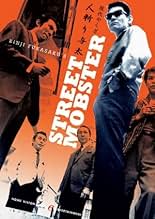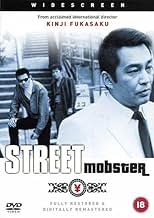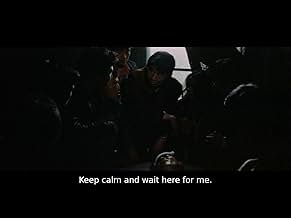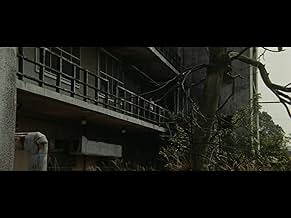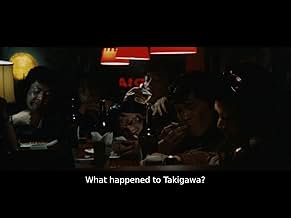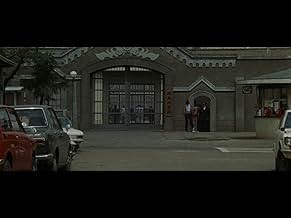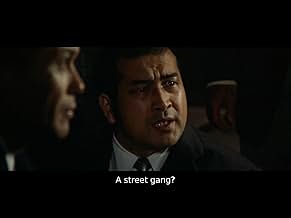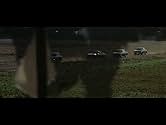CALIFICACIÓN DE IMDb
7.1/10
1.3 k
TU CALIFICACIÓN
Agrega una trama en tu idiomaA yakuza, who has an untamed rage and lack of respect for authority, finds himself leading the remnants of the gang he once belonged to in order to secure an area of their own.A yakuza, who has an untamed rage and lack of respect for authority, finds himself leading the remnants of the gang he once belonged to in order to secure an area of their own.A yakuza, who has an untamed rage and lack of respect for authority, finds himself leading the remnants of the gang he once belonged to in order to secure an area of their own.
- Dirección
- Guionistas
- Elenco
- Dirección
- Guionistas
- Todo el elenco y el equipo
- Producción, taquilla y más en IMDbPro
Opiniones destacadas
Bunta Sugawara plays a low-level criminal who keeps getting in trouble with a major yakuza clan. After a ton of screwing around with them, a second yakuza clan adopts him as one of their own. At first, everyone's happy about it, but soon enough, Sugawara feels trapped and starts to act out. This, of course, does not please his bosses. The main problem with this one is that Sugawara's character is just so unlikable - you have to wonder why the yakuza on either side keep letting him screw around so much. The mobsters from The Godfather would have whacked him instantly (especially since he's essentially a nobody; he has a few followers, but they're just punks, too). The value of the film comes from Fukasaku's direction, which seems revolutionary for 1972, almost Jason Bourne-like with hand-held cameras, thrusting the audience in the kinetic action sequences. The direction is definitely some of Fukasaku's best work.
Street Mobster is among my favorite yakuza films, and from one of my favorite Japanese directors. This is a great, less-popular Fukasaku film, and it really deserves more attention.
Okita is our "hero", if you can call him that. He's hot-heated, violent, and unapologetic. I can't think of a time in the film where he really shows restraint. He's just such an over-the-top, punk rockin' character who doesn't care about rival gangs or other thugs; he wants to do what he wants, when he wants to. And that's definitely the driving force behind the film, it's explosive nature. It's so unglamorous and filthy at times, and yet you have this sense of a man living his life, maybe not to it's full potential, but having a hell of a lot of fun doing what he's doing. And maybe he's not even enjoying it, everything else is just too conformist for him. He simply doesn't back down. So he really is a hero, a hero to the downtrodden. A counterculture icon, a raging machine.
With it's boisterous protagonist comes a slew of background characters who are really just there to make Okita the centerpiece. Aside from the prostitute that he raped years earlier and now forms a bond with (Whose name I can't even remember!) there are few other noteworthy characters. And that's really okay. When they speak, they speak to get Okita's reaction. If you don't like Okita, then you're probably not going to like the film. Me, I enjoyed this rebellious, non-conformist gangster, yelling and picking fights. It was just so over-the-top and the director clearly embraced the punk style that was emerging at the time of this film's release.
Speaking of release time, I just watched the film again a few minutes ago, and I still can't believe it was made in 1972. I'm sure you've heard it before, but it's way ahead of it's time. It looks 90s-ish to me. The shaky-cam and jump cuts stand out most as then-foreign techniques. Of course, now they've become the norm in films.
So that's my short review. I don't feel that there's a whole lot more ground to cover as Okita is really the main attraction. So if you're looking to kill 87 minutes and consider yourself a fan of exciting cinema, look no further than Street Mobster.
Okita is our "hero", if you can call him that. He's hot-heated, violent, and unapologetic. I can't think of a time in the film where he really shows restraint. He's just such an over-the-top, punk rockin' character who doesn't care about rival gangs or other thugs; he wants to do what he wants, when he wants to. And that's definitely the driving force behind the film, it's explosive nature. It's so unglamorous and filthy at times, and yet you have this sense of a man living his life, maybe not to it's full potential, but having a hell of a lot of fun doing what he's doing. And maybe he's not even enjoying it, everything else is just too conformist for him. He simply doesn't back down. So he really is a hero, a hero to the downtrodden. A counterculture icon, a raging machine.
With it's boisterous protagonist comes a slew of background characters who are really just there to make Okita the centerpiece. Aside from the prostitute that he raped years earlier and now forms a bond with (Whose name I can't even remember!) there are few other noteworthy characters. And that's really okay. When they speak, they speak to get Okita's reaction. If you don't like Okita, then you're probably not going to like the film. Me, I enjoyed this rebellious, non-conformist gangster, yelling and picking fights. It was just so over-the-top and the director clearly embraced the punk style that was emerging at the time of this film's release.
Speaking of release time, I just watched the film again a few minutes ago, and I still can't believe it was made in 1972. I'm sure you've heard it before, but it's way ahead of it's time. It looks 90s-ish to me. The shaky-cam and jump cuts stand out most as then-foreign techniques. Of course, now they've become the norm in films.
So that's my short review. I don't feel that there's a whole lot more ground to cover as Okita is really the main attraction. So if you're looking to kill 87 minutes and consider yourself a fan of exciting cinema, look no further than Street Mobster.
As can be expected from Japanese master Kinji Fukasaku, "Street Mobster" is a fast paced, stylistic and violent depiction of a low level Yakuza thug who punches to the beat of his own fist.
Bunta Sugawara plays Okita, a small time hood recently released from prison. Upon his arrival to the outside world, he finds the underworld he left behind changed. A new crew runs his old stomping grounds, and he is lost and abandoned. After teaming up with some hoodlums, Okita sets his sights on bigger things, which all leads to his downward spiral in the Japanese underworld.
Fukasaku directs this Yakuza flick with his usual visual tour de force. You can expect freeze frames, quick cuts, fast zooms, hand- held camera work, dutch angles, voice overs, a mixture of b&w and color cinematography, etc. The energy that the director supplies from behind the camera perfectly captures the momentum in which the lead characters react to their daily lives. There is a lot of action, with characters often breaking out into fights and chases at random. This kind of film needs to be taken with a grain of salt. The violence, like the melodrama and tacked on love interest, are over the top but enjoyable.
So sit back and relax. This lean, mean, fast flying fist machine of a film will keep you entertained and enthralled throughout.
Bunta Sugawara plays Okita, a small time hood recently released from prison. Upon his arrival to the outside world, he finds the underworld he left behind changed. A new crew runs his old stomping grounds, and he is lost and abandoned. After teaming up with some hoodlums, Okita sets his sights on bigger things, which all leads to his downward spiral in the Japanese underworld.
Fukasaku directs this Yakuza flick with his usual visual tour de force. You can expect freeze frames, quick cuts, fast zooms, hand- held camera work, dutch angles, voice overs, a mixture of b&w and color cinematography, etc. The energy that the director supplies from behind the camera perfectly captures the momentum in which the lead characters react to their daily lives. There is a lot of action, with characters often breaking out into fights and chases at random. This kind of film needs to be taken with a grain of salt. The violence, like the melodrama and tacked on love interest, are over the top but enjoyable.
So sit back and relax. This lean, mean, fast flying fist machine of a film will keep you entertained and enthralled throughout.
This has a similar look to some of the early 70s New York gangster and Blaxploitation flicks, only with an eye for the big moody shadows that wouldn't be out of place in a Carol Reed movie. The acting is pretty good, even when the hero is tired and emotional, and the few characters that are fleshed out are never let down by the script. It's easy to see how Riki Takeuchi and Takashi Miike misspent their youth. I wouldn't go so far as to call it a classic, but it compares very favourably with the the best of its era.
The twang of the jaws harp and the jarring off-key harmonica are a nod in the direction of Ennio Morricone. The hyper realism (and melodrama)is very much of its day. Think of Larry Cohen, Sergio Leone, Roman Polanski, Sergio Corbucci, Sam Fuller, Sam Peckinpah, Don Siegel, and their ilk in the 60s and 70s, and accept that film has always been an international conspiracy by artists with attitude. Audiences may be isolated by language, but filmmakers are interested in the visual aspects, and they don't need translation, only an understanding of technique. Kurosawa and Mishima opened up Japanese cinema to the world, and Japanese film makers responded by drawing influences from the wider world.
This movie takes the technical influences and extrapolates them into the boom years of the Japanese economy. Where's there's money, there's organised crime. The casual unaffiliated street punk was a dying breed in the 70s. It's noticeable that the "punks" don't wear suits. They look more like refugees from the beatnik era, and the jazzy sections of the score (that accompany their drunken good times) seem to be saying that their day is done. Kinji Fukasaku is as deserving of credit as any of the aforementioned masters of pulp. His eye is true, and whenever he has a decent script, he makes a good or a great movie, usually on a tight budget. Who could ask for more?
The twang of the jaws harp and the jarring off-key harmonica are a nod in the direction of Ennio Morricone. The hyper realism (and melodrama)is very much of its day. Think of Larry Cohen, Sergio Leone, Roman Polanski, Sergio Corbucci, Sam Fuller, Sam Peckinpah, Don Siegel, and their ilk in the 60s and 70s, and accept that film has always been an international conspiracy by artists with attitude. Audiences may be isolated by language, but filmmakers are interested in the visual aspects, and they don't need translation, only an understanding of technique. Kurosawa and Mishima opened up Japanese cinema to the world, and Japanese film makers responded by drawing influences from the wider world.
This movie takes the technical influences and extrapolates them into the boom years of the Japanese economy. Where's there's money, there's organised crime. The casual unaffiliated street punk was a dying breed in the 70s. It's noticeable that the "punks" don't wear suits. They look more like refugees from the beatnik era, and the jazzy sections of the score (that accompany their drunken good times) seem to be saying that their day is done. Kinji Fukasaku is as deserving of credit as any of the aforementioned masters of pulp. His eye is true, and whenever he has a decent script, he makes a good or a great movie, usually on a tight budget. Who could ask for more?
76325
Unbelievable - this ultraviolent gangster flick is from 1972 - if it wasn't for the poor monophonic sound mix on the dvd, you almost wouldn't recognize the age! Fast cuts, ultracool gangster hero, bloody beat-ups and shootings - everything that Beat Takeshi Kitano is exploring and developing to a further stage in his brilliant movies 'Hana-Bi' or 'Brother' can be found in this masterpiece as a blueprint.
Fans of Asian action cinema won't be disappointed - the film is moving so fast, the inevitable climax almost let's you lose breath - this is a true gem! Get it, see it!
Fans of Asian action cinema won't be disappointed - the film is moving so fast, the inevitable climax almost let's you lose breath - this is a true gem! Get it, see it!
¿Sabías que…?
- ConexionesFeatured in Yakuza Eiga, une histoire du cinéma yakuza (2009)
Selecciones populares
Inicia sesión para calificar y agrega a la lista de videos para obtener recomendaciones personalizadas
Detalles
- Fecha de lanzamiento
- País de origen
- Sitio oficial
- Idioma
- También se conoce como
- Street Mobster
- Productora
- Ver más créditos de la compañía en IMDbPro
Contribuir a esta página
Sugiere una edición o agrega el contenido que falta

